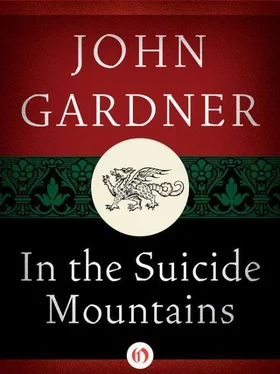It was a stupid thing, he saw at once, to have said. The prince suddenly became more dejected than ever.
“It’s filiacide,” he groaned, and in the failing light the Goat’s Son was just able to make out that large tears were falling from the prince’s beautiful dark eyes. In his misery — as if the whole burden of the world had dropped on him — the prince seemed not so much to walk as to stagger. He threw his left hand up in a dramatic gesture, the right one still holding the bridle. “I have to slay an outlaw,” he said and heaved a sigh. “The notorious six-fingered man.”
“ I’ve heard of him! ” Armida said, then stopped herself and in haste made her face shy and foolish.
“Everyone,” said the prince irritably, “has heard of the six-fingered man. Master of disguises, heart of a dragon, the man no jail in the world can hold—” He walked on a few steps, shaking his head, the tears still falling. “I haven’t got a prayer. He’ll kill me like a rabbit! What match is a mere poet and violinist for an experienced murderer?”
“Perhaps when the time comes,” Chudu began, but he let it trail off. Prince Christopher was right; he had no chance. In his mind he saw Prince Christopher lying on a heath with an arrow through his heart, Armida kneeling beside him in a long black dress, inconsolably weeping. He, Chudu, would wear his top-hat.
“Well,” Armida said, cheeks flushed with distress, “you’ll simply have to do your best.”
Christopher the Sullen laughed. It was a terrible thing to hear and made the night — or so it seemed — grow abruptly darker. “That’s what everybody says. ‘You’ll have to do your best.’ I don’t agree. Not one bit. It’s stupid! And undignified! There I’ll be, rattling my mighty lance and yelling ‘ En garde, vile villain! ’ and there he’ll be, smiling, sitting with his legs crossed, fiddling with his pen-knife—” The shame of it made Prince Christopher cover his eyes with his arm. “I won’t do it,” he moaned. “I can’t! I’d rather be hanged on a gybbit high!”
“What,” asked Armida, lowering her lashes, “is a gybbit high?”
The prince took his arm from in front of his eyes and thought about it. “I’m not sure,” he said at last.
Chudu the Goat’s Son pushed his hands into his pockets and pursed his lips. After they’d walked a little further, Chudu the dwarf taking three steps for every one of theirs, Chudu asked, gloomily fearing he could guess the answer, “Well then, Prince Christopher, what do you intend to do?”
“I’m going to kill myself,” said the prince. “I’ve made up my mind.”
Chudu the Goat’s Son nodded. “I thought so,” he said.
Armida gasped and peered through the darkness at the prince as if she might not have heard correctly. “You mustn’t!” she said. “Oh, you can’t! ” She pressed her hand to her bosom.
“I can do anything I please,” snapped the prince, “and I intend to.”
Armida fell silent, abashed at having had to be yelled at. “ I love him ,” she thought, heart full of anguish, and was astonished at herself. Tears began coursing down her cheeks, but no one saw, for it was now dark as pitch. Ahead of them, at the top of the mountain, flimmering at the very edge of Suicide Leap, there were lights. It was the Ancient Monastery.
Come in, my children,” said the abbot.
In the hazy dimness of the hallway behind him, where bats flew silently from beam to beam, and holy brothers hurried quietly, like owls, about their evening chores, there were numerous sick people lying in straw on the flagstone floors, with their relatives sitting or standing nearby, saying prayers, and their neighbors peeking in through low doors. The saintly abbot was famous far and near for his ability to heal the sick by miraculous means; also for his gentleness and wisdom. His powers were legendary; there were songs about it. From far and wide people came to him for help, and though the abbot couldn’t understand himself his miraculous power, he said, for he was no better than other men, at least in his own eyes, and perfect neither in love nor in faith, nevertheless he would admit himself (this he would say with his glowing, bald head tipped sideways, quizzical) that he seemed in some way to exert a beneficent influence, or else his legend did; he seemed, without consciously trying, merely joking and praying, in fact, to elevate the courage and faith of the sufferer so that “occasionally,” as he said (but he was absurdly modest), a cure did indeed take place. He gave the credit all to God.
“Come in, come in,” said the abbot again, bowing in a way that seemed faintly oriental, his baggy eyes beaming, his great bald dome gleaming, his ancient miracle-working hands buried deep in the folds of his floor-length black cassock, and he backed away — lightly, almost dancingly, in fact, though he was a man in his seventies — to give them room.
Armida entered first, then Chudu the Goat’s Son, scraping his cap off with one hand and looking around him in alarm and angry distrust, then Prince Christopher the Sullen, who threw one last gloomy look in the direction of the horse being led to his stable, which was somewhere around back, then stepped in and closed the door behind him.
“You’re just in time for supper,” said the gentle old man, and his smile was so warm, so absolutely simple and pure and personally affectionate, that even Chudu the Goat’s Son was inclined to partly trust him.
“Thank you, father,” said Armida, and for some reason curtsied.
Prince Christopher the Sullen said, “Let us introduce ourselves. This is Armida, and this is—” He glanced down at Chudu the Goat’s Son, but the dwarf flicked his eyes away. It was against his policy to tell anyone his name. Prince Christopher looked puzzled but retired behind a sad smile and did not press. “This is Armida’s dwarf,” he said, “and I am — Christopher.”
The abbot lit up. “Ah ha! Prince Christopher the Sullen! Exactly! I thought I recognized that incomparable, grieving face! I’ve seen you, light of my life, in visions.” He brought this out with such perfect simplicity that no one even noticed that the claim might have seemed, on some other man’s lips, preposterous. He leaned forward, toward the prince. “How’s your poor father?”
“Much better lately, thank you,” said Prince Christopher. He’d forgotten that his father had been unwell.
“God bless him,” said the abbot, beatifically smiling, and his eyes went unfocused for an instant, as if he was looking at something far, far distant, quite possibly the Throne of God. “Well!” he said then, “this is an honor! Yes yes! Exactly! Now we’re on the track! — But I forget myself, you’re starving!” He nodded down the hallway, past the sufferers in the straw, the watchful relatives and neighbors, toward an archway. “You go right through there, my loves — right through there, exactly! — and the brothers will provide you with fresh clothing and food and anything you need. I’ll be in in a minute. I have to—” He smiled and looked floorward, his shoulders briefly rising in a meek, apologetic shrug.
Chudu the Goat’s Son said, head tipped back, staring straight up at him with ferocious and unabashedly skeptical eyes, eyes close together and empty and black as shotgun barrels: “You mean you’re going to heal these sick people?”
“Well, try anyway, with God’s help,” said the abbot with a laugh.
“Goodness,” said Armida, forgetting to look dim-witted, “is it possible that a person might watch?”
“God bless you, my child, for your interest! Certainly you may watch!” He turned his smile toward the prince. “Would you care to watch too? — And you too, of course, my friend.” He bent to smile at Chudu.
Читать дальше












